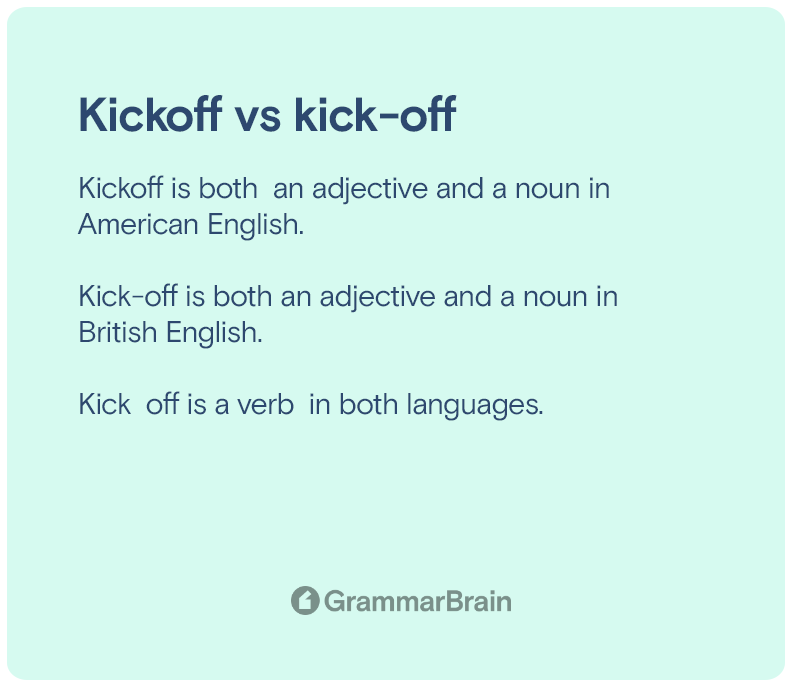Is it kick off or kick-off? Is there is a hyphen in the between the words “kick” and “off?” This can be a common misspelling in American English. And cause confusion for new writers. Learn the key differences in this short American English guide.
Kick off vs. kick-off
It is critical to be at the stadium on schedule to prevent missing the beginning of the game. Kickoff is the term used in American football to describe the start of the game.
But many of you might be confused between Kick-off or Kick off. so, what do you think Is it kick-off or kick off?
You’ve probably seen the term spelled in different newspaper articles. The fact is that they are all acceptable terms. The distinction is determined by the statement’s context and how the word is employed. The term can be used as a noun, an adjective, or a verb in any of these three forms.
In this article, I’ll examine the spellings kick-off, kickoff, and kick off. Also, I’ll explain how each spelling works within a phrase and give you some examples so you can see it in operation.
In addition, I will give you a useful mnemonic that will make selecting kick-off or kickoff or kick off a little easier.
| Word | Definition |
| Kick off | (of a football game, soccer game, etc.) be started or resumed after a score by a player kicking the ball from a designated spot. |
When should you use “Kickoff?”
Kickoff can be used as both a noun and an adjective. As a noun, it refers to the start of anything. Here are some examples that will give you a better understanding of the concept:
- Next week’s football kickoff is at 2:00 pm; Therefore, we have to leave by 11:30 am to get to the stadium on time and find our seats.
- Since the kickoff, the defensive side has been struggling, whereas the other team has scored 24 points.
Kickoff, as an adjective, refers to anything that occurs first, for instance, the first match in a sport or the first lecture at a scientific conference. let’s see some examples to understand it in a better way.
- Daniel and Serena organized a kickoff dinner to celebrate their child’s first win in the soccer tournament.
- The kick-off event would be a sitar performance by Pandit Ravi Shankar.
When should you use “Kick-Off?”
Kick-off is an abbreviation of the word kickoff. It serves the same purposes and meanings as kickoff and may be employed as a noun or adjective. The only difference is where it is being used.
In American English, the unhyphenated kickoff is the more prevalent term. On the contrary, In British English, the hyphenated kick-off is more prevalent.
When should you use “Kick Off?”
Kick-off is a verb when broken down into two words. It implies beginning or restarting anything, particularly a sports event. Let’s look at some examples that will help you understand this concept in a better way.
- Ashish Nehra kicked off the third inning of India vs Sri Lanka match by striking out Kumar Sangakkara.
- We won’t be able to start the celebration until my daughter comes. She is the heart and soul of the party.

Method for remembering the difference
It’s as easy to remember the distinction between kickoff vs kickoff vs kick off as it is to remember which part of the speech a particular word belongs to.
- Kickoff is both an adjective and a noun in American English.
- Kick-off is both an adjective and a noun in British English.
- Kick off is a verb in both languages.
Thant means kick-off and kickoff are both adjectives and nouns, although kick off is solely a verb.
Inside this article
Fact checked:
Content is rigorously reviewed by a team of qualified and experienced fact checkers. Fact checkers review articles for factual accuracy, relevance, and timeliness. Learn more.
Core lessons
Glossary
- Abstract Noun
- Accusative Case
- Anecdote
- Antonym
- Active Sentence
- Adverb
- Adjective
- Allegory
- Alliteration
- Adjective Clause
- Adjective Phrase
- Ampersand
- Anastrophe
- Adverbial Clause
- Appositive Phrase
- Clause
- Compound Adjective
- Complex Sentence
- Compound Words
- Compound Predicate
- Common Noun
- Comparative Adjective
- Comparative and Superlative
- Compound Noun
- Compound Subject
- Compound Sentence
- Copular Verb
- Collective Noun
- Colloquialism
- Conciseness
- Consonance
- Conditional
- Concrete Noun
- Conjunction
- Conjugation
- Conditional Sentence
- Comma Splice
- Correlative Conjunction
- Coordinating Conjunction
- Coordinate Adjective
- Cumulative Adjective
- Dative Case
- Determiner
- Declarative Sentence
- Declarative Statement
- Direct Object Pronoun
- Direct Object
- Diction
- Diphthong
- Dangling Modifier
- Demonstrative Pronoun
- Demonstrative Adjective
- Direct Characterization
- Definite Article
- Doublespeak
- False Dilemma Fallacy
- Future Perfect Progressive
- Future Simple
- Future Perfect Continuous
- Future Perfect
- First Conditional
- Irregular Adjective
- Irregular Verb
- Imperative Sentence
- Indefinite Article
- Intransitive Verb
- Introductory Phrase
- Indefinite Pronoun
- Indirect Characterization
- Interrogative Sentence
- Intensive Pronoun
- Inanimate Object
- Indefinite Tense
- Infinitive Phrase
- Interjection
- Intensifier
- Infinitive
- Indicative Mood
- Participle
- Parallelism
- Prepositional Phrase
- Past Simple Tense
- Past Continuous Tense
- Past Perfect Tense
- Past Progressive Tense
- Present Simple Tense
- Present Perfect Tense
- Personal Pronoun
- Personification
- Persuasive Writing
- Parallel Structure
- Phrasal Verb
- Predicate Adjective
- Predicate Nominative
- Phonetic Language
- Plural Noun
- Punctuation
- Punctuation Marks
- Preposition
- Preposition of Place
- Parts of Speech
- Possessive Adjective
- Possessive Determiner
- Possessive Case
- Possessive Noun
- Proper Adjective
- Proper Noun
- Present Participle
- Prefix
- Predicate



